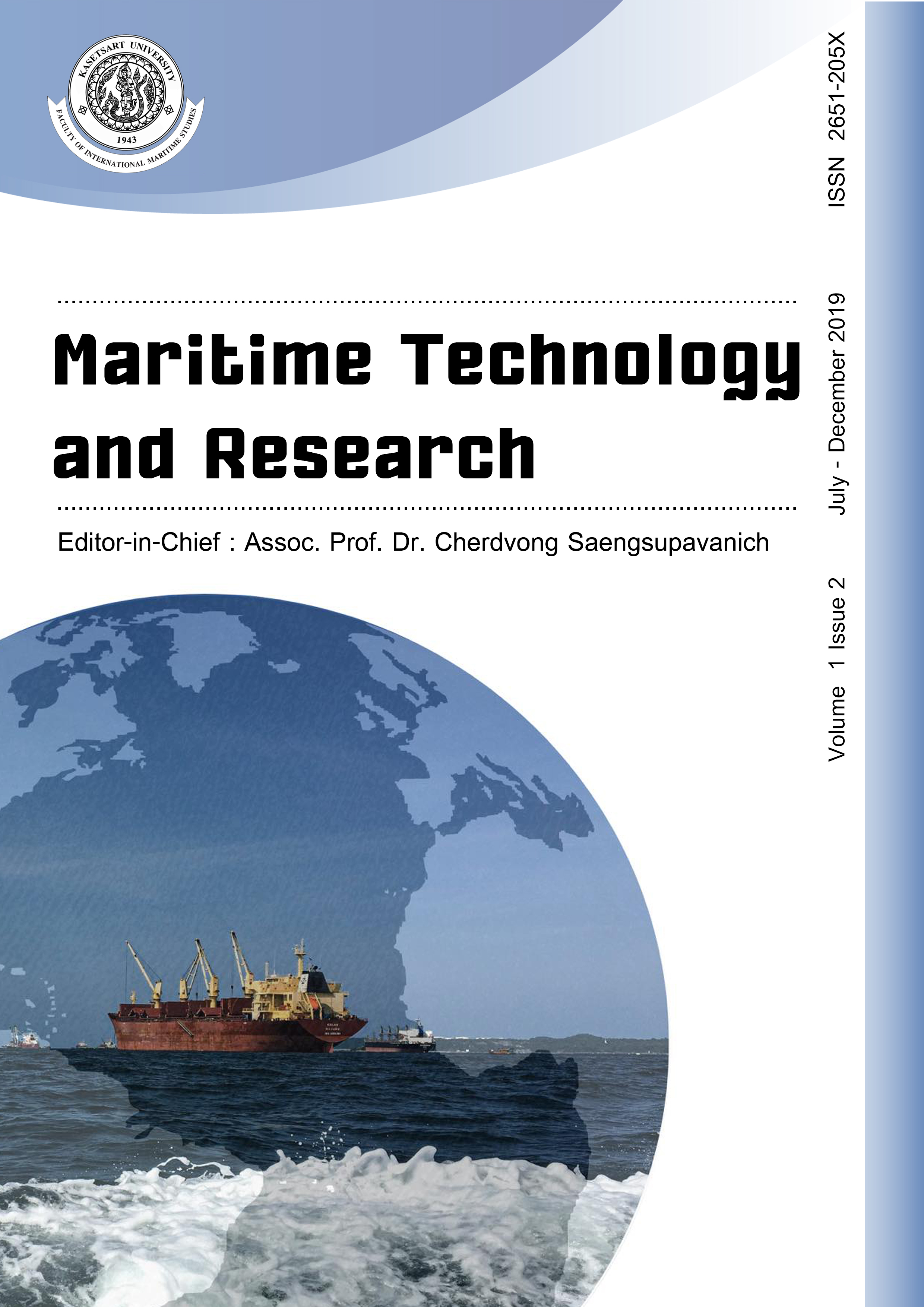The role of Bangladeshi ports in developing integrated intermodal freight transportation system in South Asia
DOI:
https://doi.org/10.33175/mtr.2019.175760Keywords:
Transport, Intermodal, Bay of Bengal, OBOR, India, ChinaAbstract
This paper aims to find out the role of Bangladeshi ports in South Asia for developing integrated intermodal freight transportation system to mitigate the demand of port transport in the region through container from port to inland container depot or dry port or inland container terminal even from/to shipper/consignee premises. The strategic location of Bangladeshi ports in the Bay of Bengal are lucrative for the international traders, investors and others to invest in the port industry as well as manufacturing industry to develop international trade in South Asia especially in India, Nepal , Bhutan and Bangladesh . In addition, Bangladesh has opportunity to serve Myanmar through coastal shipping and road haulage of containers. In here, port rivalry among the ports of Bangladesh, India and Sri Lanka is described to focus the importance of Bangladeshi ports also to get the real scenario of port facilities in South Asia. At the end of the paper, deep port initiative is attributed to connect with the One Belt, One Road (OBOR) initiative of China. Finally, in the view of intermodal freight transportation and port competition in the regions, future directions are stated for Bangladeshi ports to compete with others in the South Asian region.
References
Berkoz, L, & Tekba, D. (1999). The role of ports in the economic development of Turkey. In Proceedings of the 39th Congress of the Regional Science Association, Dublin, Ireland.
Brooks, M. R., Cullinane K. P. B., & Pallis, A. A. (2017). Revisiting port governance and port reform: A multi-country examination. Research in Transportation Business & Management 22, 1-10. doi:10.1016/j.rtbm.2017.02.005
Carbone, V., & De Martino, M. (2003). The changing role of ports in supply-chain management: An empirical analysis. Maritime Policy and Management 30(4), 305-320. doi:10.1080/0308883032000145618
De Martino, M., & Morvillo, A. (2008). Activities, resources and interorganizational relationships: Key factors in port competitiveness. Maritime Policy and Management 35(6), 571-589. doi:10.1080/03088830802469477
Evers, P. T., Harper, D. V., & Needham, P. M. (1996). The determinants of shipper perceptions of modes. Transportation Journal 36(2), 13-25.
Ghosh, B. & De, P. (2001). Indian ports and globalisation: Grounding economics in geography. Economic and Political Weekly 36(34), 3271-3283. doi:10.2307/4411030
Islam, M. (2016). Regional connectivity: Current challenges for Bangladesh. Seminar paper of Bangladesh Economic Society-Chittagong Chapter.
Janic, M. (2007). Modelling the full costs of an intermodal and road freight transport network. Transportation Research Part D 12, 33-44. doi:10.1016/j.trd.2006.10.004
Jarzemskis, A., & Vasiliauskas, A. V. (2007). Research on dry port concept as intermodal node. Transport 22(3), 207-213. doi:10.1080/16484142.2007.9638126
Kharel, P. (2009). Case for South Asian transit arrangement. SSRN Electronic Journal 11, 1-8. doi:10.2139/ssrn.2153123
Karim, M. A. (2015). China’s proposed maritime silk road: Challenges and opportunities with special reference to the Bay of Bengal region. Pacific Focus 30(3), 297-319. doi:10.1111/pafo.12059
Kumar, C. R. (2008). Research methodology. New Delhi, India: APH Publishing Corporation.
Lain, S., & Pantucci, R. (2015). The economics of the silk road economic belt. Workshop paper by Royal United Services Institute, London, UK.
Lloyds List. (2018). Lloyd's list top 100 container ports: Rankings. Retrieved from https://maritimeintelligence.informa.com/content/top-100-ports-form?utm_source= sw&utm_medium=landing&utm_campaign=top100ports&utm_content=v1
Maslaric, M., Brnjac, N., & Bago, D. (2016). Intermodal supply chain risk management. Pomorski Zbornik 52, 11-31. doi:10.18048/2016.52.01
Mathisen, T. A., & Hanssen, T. E. S. (2014). The academic literature on intermodal freight transport. Transportation Research Procedia 3, 611-620. doi:10.1016/j.trpro.2014.10.040
Min, K. C. (2016). News from Northeast Asia. Retrieved from https://iias.asia/sites/default/files/ IIAS_NL74_14.pdf
Monios, J., & Bergqvist, R. (2015). Intermodal terminal concessions: Lessons from the port sector. Research in Transportation Business & Management 14, 90-96. doi:10.1016/j.rtbm.2014.09.002
Monios, J., & Wilmsmeier, G. (2013). The role of intermodal transport in port regionalization. Transport Policy 30, 161-172. doi:10.1016/j.tranpol.2013.09.010
Muntean, M. C., Nechita, D., Nistor, C., & Şarpe, D. (2010). Port management importance in port activities development. In Proceedings of the 3rd WSEAS International Conference on Urban Planning and Transportation, Corfu Island, Greece, pp. 180-186.
Neuman, W. L. (2011). Social research methods: Qualitative and quantitative approaches. Essex, United Kingdom: Pearson Education Limited.
Notteboom, T. E., & Rodrigue, J. P. (2005). Port regionalization: Towards a new phase in port development. Maritime Policy & Management 32(3), 297-313. doi:10.1080/03088830500139885
Rahman, M. (2005). Visionary leadership with bold initiative for national development: Bangladesh position in Asia. Asian Affairs 27(1), 46-55.
Rodrigue, J. P., & Notteboom, T. E. (2010). Foreland-based regionalization: Integrating intermediate hubs with port hinterlands. Research in Transportation Economics 27(1), 19-29. doi:10.1016/j.retrec.2009.12.004
Silborn, H. (2008). Measures promoting intermodal transport as an alternative to pure road transport. In Proceedings of the International Conference on Heavy Vehicles. Paris. doi:10.1002/9781118557464.ch4
Wang, Y., Bilegan, I. C., Crainic, T. G., & Artiba, A. (2014). Performance indicators for planning intermodal barge transportation systems. Transportation Research Procedia 3, 621-630. doi:10.1016/j.trpro.2014.10.041
Wang, S., & Notteboom, T. E. (2015). The role of port authorities in the development of LNG bunkering Facilities in North European Ports. WMU Journal of Maritime Affairs 14, 61-92. doi:10.1007/s13437-014-0074-9
UNCTAD. (2015). Review of maritime transport. Geneva, Switzerland: UN.
Downloads
Published
Issue
Section
License
Copyright: CC BY-NC-ND 4.0








